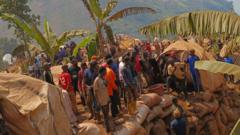More than 10,000 individuals toil daily at the expansive Rubaya mine in the eastern Democratic Republic of Congo (DRC), unearthing coltan ore, essential for mobile phone manufacture. Recently, M23 rebel forces permitted a BBC team to gain access to this site, showcasing the relentless work undertaken by miners, often without any idle time in sight.
The scene reveals a sprawling landscape dotted with pits and tunnels, where some workers dig deep underground, while others labor to carry heavy sacks containing coltan ore. The ore then undergoes washing and filtering, as quoted by site supervisor Patrice Musafiri, who has managed the mine since its occupation by the rebels in April of the previous year. "We usually have more than 10,000 or more people working here daily," he remarked.
Navigating this challenging terrain often requires assistance, as reported by Peter Osiasi, a miner who noted high temperatures and potential harmful gases lurking in the mines. He expressed gratitude for the financial stability that mining has afforded him, stating, "My life has really changed." The Rubaya mine lies within the lush Masisi Hills of North Kivu province, known for containing 15% of the world’s coltan supply, attracting global investment interest.
The area has historically generated wealth for various armed factions, including the current M23 rebels, who maintain order at the mine, ensuring that armed personnel are prohibited on-site. Recent events include a ceasefire agreement made in Washington aimed at resolving long-standing instability. Nonetheless, the M23 remains outside this agreement's purview and has actively expanded its control.
International complexities arise as allegations surface regarding Rwandan support for the M23, which the Rwandan government denies. The recent peace initiative appears intertwined with access to DRC’s valuable mineral resources, essential for international stakeholders, as articulated by former U.S. President Donald Trump.
During the short visit to Rubaya, miner Osiasi confirmed that improved conditions have fostered better business operations. However, he also lamented the low wages, stressing the need for incentivization. The reality is that mining communities often lack necessary infrastructure, exacerbating their challenges even as the region holds vast mineral wealth.
The potential for investment looms large, yet its impact remains uncertain given the ongoing power dynamics governed by the M23. Political analysts suggest that an American presence might deter conflict and promote stability. As dialogues unfold, local miners like Osiasi yearn for lasting peace, along with rising pay, emphasizing their role in fostering a better future for themselves and their communities. “My appeal to fellow young men and our leaders is to keep and maintain peace in our area," Osiasi concluded.



















